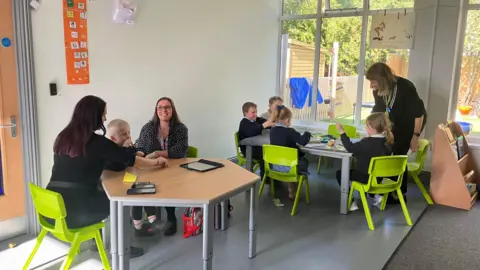Kate McGoughEducation reporter

 BBC
BBC
Supporting children with special educational needs and disabilities (Send) in England will cost the government an extra £3bn a year by 2029 if the system is not reformed, a think tank has warned.
The government is already spending £12bn this year on supporting those with Send, a figure that has risen by 66% in the last decade.
Under current projections, there will also be an extra 220,000 children and young people with education, health and care plans (EHCPs) by 2029, the Institute for Fiscal Studies (IFS) says.
The government is expected to publish its plans on how it will reform the Send system in the coming weeks.
A rise in the number children receiving Send support in schools has driven what the IFS calls a "dramatic and ongoing" increase in spending.
"The truly shocking thing is that despite this increase in spending, we are still left with a system that is failing to cope with the needs of these children and young people," Pepe Di'Iasio, general secretary of the Association of School and College Leaders, said.
One in five pupils (1.7 million) in England get some kind of support for special educational needs in school at the moment.
And 482,000 of them (or 5.3% of all pupils) get the higher level of support from individual EHCPs, a legal document setting out a child's tailored support needs, which councils have to provide and pay for.
The rising costs of Send support have forced local authorities into hundreds of millions of pounds of debt.
A government agreement meant councils have been able to keep Send deficits off their financial books, and now there are calls for the total debt - which is forecast to reach £5bn next year - to be wiped completely.
Amanda Hopgood, of the Local Government Association, says that would "put councils on a stable financial footing", as well as addressing "outdated legislation that leaves councils facing rising and unsustainable costs".
The IFS is predicting that the proportion of pupils with EHCPs will rise even further in the next four years, to 8% of all pupils aged four to 16.
In July, the government refused to rule out scrapping EHCPs as part of their upcoming reforms.
Education minister Georgia Gould has since said "there will always be a legal right to additional support", adding that children, families and teachers will be "at the forefront" of Send reforms.
Currently, the first £6,000 of Send support comes from school budgets - but costs above that in mainstream schools, and the full costs of support in special schools, are covered by councils.
Educating children in special schools is significantly more expensive than in mainstream settings. The average cost of funding one place at a state special school is £23,900 per year, or £61,500 per year for an independent special school.
The government wants more early intervention and more Send pupils to stay in mainstream education.
Angela Mawer, grandmother and legal guardian to seven-year-old Colby, says she felt like she had "won the lottery" by finding him a place in mainstream education which could cater to his needs.
"It's really sad that I should have to feel like that," she said.
"There isn't enough provision for children like Colby."

 Family handout
Family handout
Angela is now looking for a suitable place in a specialist school for her grandson Colby
Colby has spent three years at Littlecoates Primary Academy in Grimsby, in a council-funded and specially-resourced part of the school called Launchpad, which provides dedicated areas for Send support within mainstream schools in the area.
Colby will soon need to move on to a more specialised setting to continue his education, but Angela says he has "come on leaps and bounds" during his time there.
There are 12 spaces at the Littlecoates Primary Launchpad site for Send pupils in reception up to Year 2. Most are offered a place by the council after struggling in mainstream schools, or not being able to find a school place that will meet their needs.
The aim is to help children adjust to mainstream classes with short-term support from specialist staff. It's been running for three years, with 100 more places planned for schools across North East Lincolnshire.
Seven-year-old Finley has managed to successfully integrate into a Year 2 class with the support of Launchpad.
Simply joining in with his classmates' phonics practice was something his mum Claire says she "didn't dare to dream could happen".
"Getting to the point where Finley has made all this progress, I could burst with pride," she says.

 Family handout
Family handout
Claire says most mainstream school staff do not have the training to deal with the needs of children like her son Finley
But Claire says most mainstream schools have got a long way to go before they can properly support Send pupils.
"The government needs to put a lot of work into ensuring mainstream settings can meet children's needs," she says.
"I don't feel like mainstream staff have got the right training to be able to deal with some of the special needs of the children."
Kate Cowdroy, who runs Launchpad, says children can make "phenomenal progress" with the right support, even if some have to go on to a specialist setting.
"The reality is a lot of schools haven't got funding like this available to them," she says.
"Some of the children they're putting in mainstream classrooms, they're setting them up to fail on a daily basis."
The BBC has approached the Department for Education for comment.
.png)
 2 months ago
10
2 months ago
10








 English (US) ·
English (US) ·